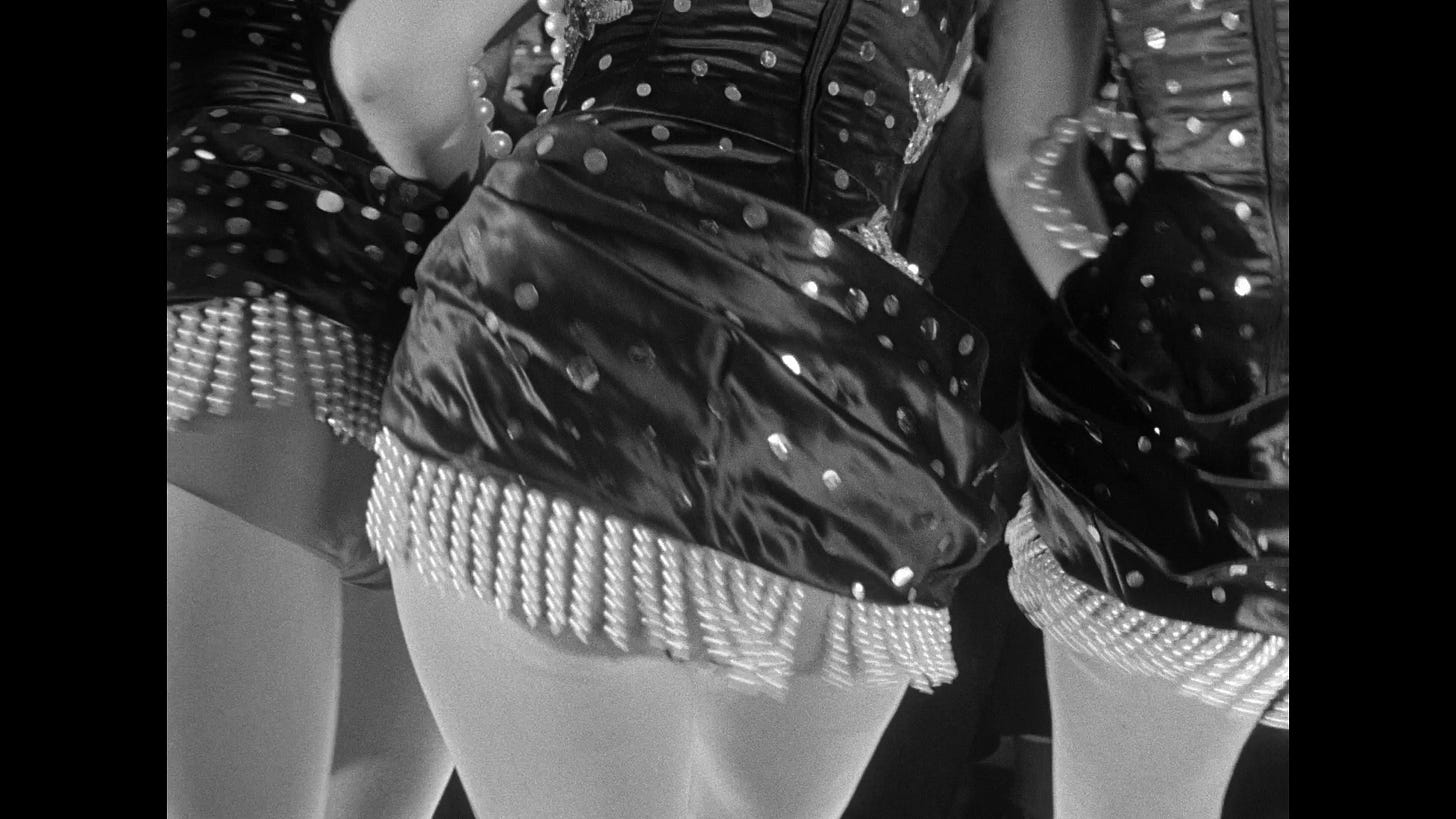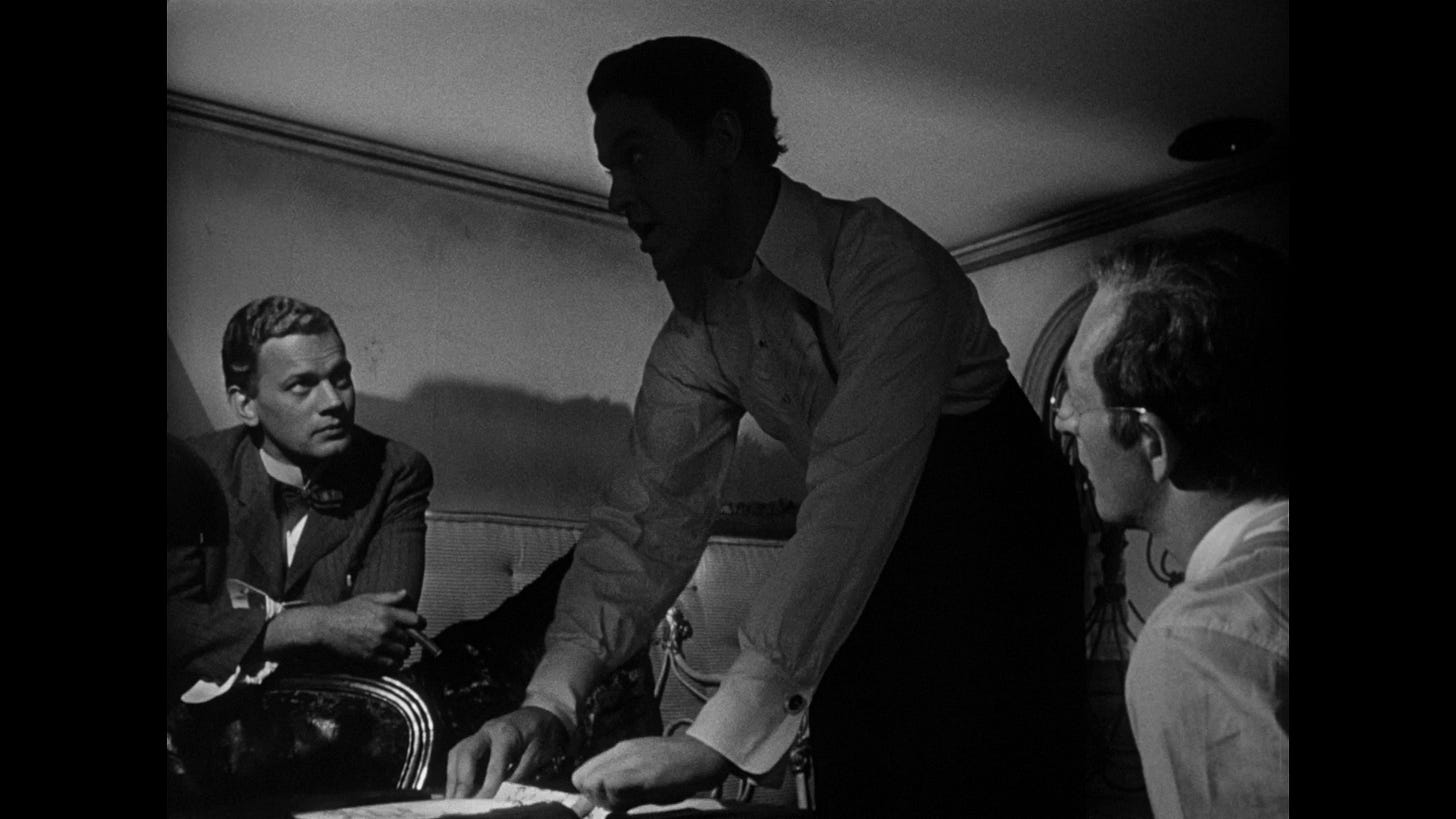I’m squeamish about this post because, unlike quite a few moviegoers over the last century or more, I don’t have much taste for crass humor. Other than whatever Mike Judge is up to, and Gulliver peeing on the Lilliputians’ castle in Gulliver’s Travels, it doesn’t usually sit well with me.
So then when I watched “Citizen Kane” yesterday, for perhaps the 10th time, I couldn’t help but noticed I was being mooned by three woman.
Cue me blushing.
Believe it or not, this crass shot teaches us something amazing about “Citizen Kane” and even how to watch a movie, but more on that later.
Anyway, why hadn’t I ever noticed this before? Possibly my prudery made me miss it, but truthfully the moment flashes by, more like a flashing than a mooning.
Actually we are being mooned thanks to 26-year-old prodigy Orson Welles and his editor Robert Wise, who kick off this vain party-scene with the most salacious shot that the Hollywood censorship code could withstand.
I’m shocked even that the above image was allowed. You can see ladies’ underpants in an unnecessary scenario. My reading of the Hays Code would say this is a violation.
Then again, if I didn’t notice this until the 10th time through, maybe the studio executives and other higher-ups didn’t notice, or they thought it was too quick to warrant rebuke. (Welles did have full creative control over “Kane.”)
Now the question we should always pursue is, “why is this butt in the movie?” I am not content with simply noticing this!
It turns out there are more butts in the film than this! I counted three butt jokes this time around; it’s possible I missed more.
There’s this shot, with plenty of visual punch.

And then later, in the same shot, there’s this:
In both shots immediately above, Kane’s rear-end looks like it’s stuck in the face of one of his friends, thanks to forced perspective. Possibly because of the shadows, these shots weren’t looked at in the crass way they could be by the censors.
Until I was looking for rear-end humor in “Citizen Kane,” I wouldn’t have seen it.
Three butt jokes means that “Citizen Kane,” as its reputation would suggest, is in the upper 1% of movies ever . . . in terms of number of butt jokes told.
I bet that in Ingmar Bergman’s stellar 48-feature career, he never told one butt joke, verbally or visually. Welles beat him in just his first outing.
I asked you above “why the butts?”, and one absolutely crucial way to study “Kane” now comes up. There’s no shot that’s not from a storyteller’s perspective.
Every piece of information in the movie is contained within a storyteller’s biased framework, as the reporter in the film and we viewers try to figure out who Charles Foster Kane was.
Like these storytellers’ biased frameworks, the nature of film itself means that all shots ever made in any video-based artwork are constructed from an interested, biased, distorted, limited viewpoint.
Welles went on to highlight this nascent postmodern concern about Film itself many times in his stellar career; see his 1973 documentary “F for Fake,” in which he thoroughly discusses this as explicitly as he ever did.
In “Citizen Kane,” the storyteller who emphasizes rear-ends is Bernstein, the one lifelong admirer of Charles Foster Kane who was close to him from his youth onward.
As a friend, he’s almost a Kane sycophant.
Check out the creepy looming painting of Kane that hangs dominantly above his desk. Here, he’s beginning to tell the reporter his story of Kane.
He seems to be girl-crazy, too. The first thing he tells the reporter is a story of his infatuation with a girl he only glimpsed one time, briefly. He says that he never has one day go by that he doesn’t think of her.
Maybe that’s super-romantic. Maybe that’s nostalgic. Or it could be just plain lustful.
No matter: from the beginning, Bernstein emphasizes bodies, female bodies especially, as that which he’ll fixate on and continue to stew over.
It’s in his narrative we see Kane at his most physically sauve. Young and vigorous, Kane takes control of the New York Inquirer and turns it into a media empire. Bernstein’s narrative tends to depict the awesome, massive presence of Kane, who commanded vast wealth and vast information networks.
His story even ends in a kind of triumph for Kane: scoring the ultimate female, the niece of the President as Kane’s future bride.
Maybe that’s why it’s in his narrative that we get the three-female moon shot.
So Bernstein tells the butt-jokes, or gets to be the butt of the jokes. It may be both.
In that shot of Kane’s rear-end looking like it’s in his face, Bernstein might be playfully mocked by Welles. It looks like he’s an “arse-kisser” — see below.
I use “arse-kisser” because the Oxford English Dictionary records that particular slang word as being slightly older than the United States of America. It was presumably in use in the 1930s, as the OED shows. Who knows if Welles used it himself?
But he did know Shakespeare, and thus he knew the plethora of butt jokes in the Bard’s canon, including the character Bottom in “A Midsummer Night’s Dream.” Plenty of Shakespeare’s characters act as “butt-kissers” from time to time, including Polonius’ flattery of Hamlet.
Bernstein may be considered a buttkiss. He never stops loving Kane, even though his friend Jedidiah Leland hates that Kane betrayed his political principles, and two ex-wives hated Kane because he was manifestly a bad husband.
Both Bernstein and Leland are shown, at the end of Bernstein’s narrative about Kane, among letters on the Inquirer’s building. They are in the rear of the word “Inquirer,” almost as if the letters “r-e-r” could be read as “r-e-a-r.”
You might think that’s a stretch, and so I’ll concede that.
Yet “Citizen Kane” is always showing how people are controlled by words, just as Kane himself tries to control public opinion through his media empire. Literally here, the letters contain the viewpoint of Bernstein, through which he sees Kane riding away in triumph with a very powerful and rich American woman.
That’s the view that his story gets across in “Kane,” an antidote to other storytellers who dislike or even despise Kane.
How about the shot I gave you earlier, when Leland gets Kane’s rear-end in his face? Let’s look at that.
This crucial moment of the movie is when the three friends vow to use their newspaper as a platform for their working-class agenda. Kane signs his “Declaration of Principles” here.
But while he does, his ass is literally pictured in Leland’s face.
That sets us up for the event later in the movie, when Kane, old and beyond vain, tries to control his wife by forcing her to become an opera-star. He also forces everyone to believe and accept that she’s a legitimate opera singer, using print to shape those opinions.
When Susan (his second wife) rages about a bad review about her performance — which Kane himself wrote! — Leland sends Kane the Declaration of Principles in an envelope. Kane tears it up and calls it “an antique.”
It’s as if the old progressive leftist has forsaken the righteous causes of his youth and betrayed the values he stood for. (This, btw, is Leland’s limited/biased POV on Kane.)
So it turns out that Leland was treated as an ass the entire time. The “Declaration” meant nothing to Kane in the long run. As he signs it, therefore, the camera tips us off visually that Leland can only be a follower and rant about this, but he can’t do anything about it.
Or, he’s trapped by the almost-literal ass-kissing — again, I blush — that Bernstein’s doing to Kane’s rear-end. Look at the placement of Bernstein’s face, Leland’s entire body, and Kane’s back-side here.
Part of me wants to conclude what I always have, that “Kane” is a moralistic movie about how to treat American moguls who posture as emperors and titans. No one, it says, should be their buttkissers.
It’s better to be like the young Kane, a courageous young skeptic about the powers-that-be, which party or interest they might be beholden to. (Leland is called an “anarchist” for that belief, and Kane for awhile veers towards that position.)
America, the movie might also say, is not a place for sycophants or “arse-kissers.” Later in his life, because he can buy them, Kane pieces together a society of paid-for friends and servants. Susan rages against this lack of true sociality. She can’t stand what his money has done to his relationships. But Kane would like to buy happiness, including buying friendships.
A bought-friendship is likely to be called, at least in my sphere, a “butt-kisser.” And as always, that’s made literal by the visual layout of a couple of shots in this great movie.
As one of my friends said to me when I told him about this article, maybe instead of calling it “Rosebud” they should call it . . . “Rosebutt.”












